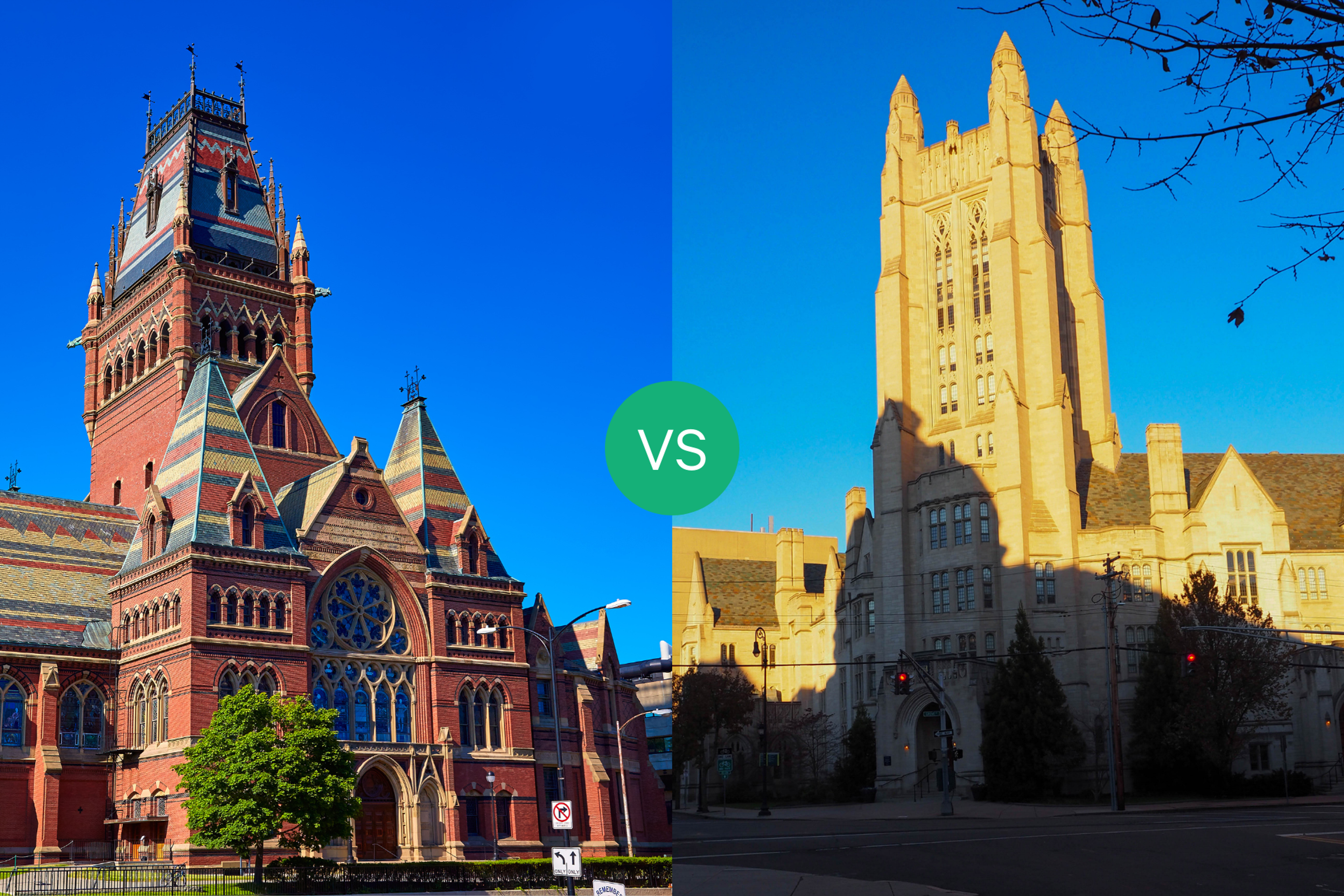Georgetown University Law Center Vs. University of Texas--Austin School of Law: An In-Depth Comparison
Discover the key differences between Georgetown University Law Center and University of Texas--Austin School of Law in this comprehensive comparison.
Posted April 10, 2025

Table of Contents
Free Event

Featuring Indrani S.
Law School App Office Hours with a Former Stanford AdCom Member
Starting Thursday, April 17
11:30 PM UTC · 45 minutes

Featuring Indrani S.
Choosing a law school can be a daunting task, with so many factors to consider. If you're deciding between Georgetown University Law Center and University of Texas--Austin School of Law, you're in luck. In this article, we'll give you an in-depth comparison of these two prestigious institutions, covering everything from their locations and campus facilities to their faculty and student body. By the end of this article, you should have a better idea of which school is the right fit for you.
Overview of Georgetown University Law Center and University of Texas--Austin School of Law
Georgetown University Law Center (GULC) is a top-ranked law school located in the heart of Washington D.C. Established in 1870, GULC is one of the largest law schools in the country, with a student body of over 2,000 and a faculty of over 100. The school offers a range of programs, including J.D., LL.M., and S.J.D. degrees, as well as joint degree programs with other Georgetown graduate schools.
University of Texas--Austin School of Law (UT Law) is also a highly-regarded law school, located in Austin, Texas. Established in 1883, UT Law is one of the oldest law schools in the state and one of the largest public law schools in the country. The school offers a J.D. program, as well as joint degree programs with other University of Texas graduate schools.
Both GULC and UT Law have strong reputations for their faculty and academic programs. GULC is known for its focus on public interest law and international law, while UT Law is recognized for its strength in energy and environmental law. Additionally, both schools offer a variety of clinics and experiential learning opportunities for students to gain practical legal experience.
Location and Campus Facilities Comparison
GULC is located in the heart of Washington D.C., just a few blocks from the U.S. Capitol and the Supreme Court. The law school occupies several buildings, including the Bernard P. McDonough Hall and the Gewirz Student Center. The campus also includes a state-of-the-art sports and fitness center, as well as several dining options and housing options.
UT Law is located on the campus of the University of Texas at Austin, which spans over 400 acres in the heart of the city. The law school is housed in several buildings, including the Townes Hall and the Tarlton Law Library, which is one of the largest academic law libraries in the country. The campus also includes several dining options and housing options, as well as recreational facilities.
One notable difference between the two campuses is their surroundings. While GULC is located in the bustling city center of Washington D.C., UT Law is situated in a more spacious and green environment. The University of Texas at Austin campus is known for its beautiful landscaping and outdoor spaces, including the famous Turtle Pond and the Lady Bird Johnson Wildflower Center. This provides students with a peaceful and serene atmosphere to study and relax in between classes.
Rankings and Accreditation Comparison
Both GULC and UT Law are highly-ranked law schools, but GULC is consistently ranked higher in national rankings. According to U.S. News and World Report 2022 rankings, GULC is ranked #14, while UT Law is ranked #23. GULC is also accredited by the American Bar Association (ABA), while UT Law is accredited by the ABA and the Association of American Law Schools (AALS).
It is worth noting that while GULC is ranked higher overall, UT Law is ranked higher in certain specialty areas such as environmental law and dispute resolution. Additionally, UT Law has a strong reputation for its clinical programs, which provide students with hands-on experience in various legal fields. These programs include the Capital Punishment Clinic, the Domestic Violence Clinic, and the Entrepreneurship and Community Development Clinic.
Admission Requirements Comparison: LSAT, GPA, Personal Statement, etc.
Both GULC and UT Law have rigorous admission requirements, including LSAT scores, GPAs, personal statements, and letters of recommendation. According to their websites, the median LSAT score for incoming students at GULC is 168, with a median GPA of 3.78. UT Law's median LSAT score is 166, with a median GPA of 3.7. Both schools also require applicants to submit a personal statement and letters of recommendation.
In addition to these requirements, GULC also considers work experience, extracurricular activities, and community service when evaluating applicants. They value a diverse range of experiences and backgrounds in their student body. UT Law, on the other hand, places a strong emphasis on academic achievement and intellectual curiosity. They look for applicants who have a passion for the law and a desire to make a positive impact in their communities.
It's important to note that meeting these admission requirements does not guarantee acceptance into either school. Both GULC and UT Law receive a high volume of applications each year and have a competitive selection process. Applicants should strive to present themselves as well-rounded individuals with a strong academic record, relevant experience, and a clear vision for their future in the legal profession.
Tuition Fees and Financial Aid Comparison
Law school tuition can be expensive, so it's important to consider the costs of attending each school. According to their websites, tuition at GULC for the 2021-2022 academic year is $65,540 for J.D. students. UT Law's tuition for in-state students is $37,776, and for out-of-state students, it's $55,690. Both schools offer financial aid and scholarship opportunities, and it's worth noting that GULC has a higher percentage of students who receive grant or scholarship aid (81% compared to UT Law's 62%).
It's also important to consider the cost of living in the area surrounding each law school. Washington D.C., where GULC is located, has a higher cost of living compared to Austin, where UT Law is located. This means that students attending GULC may need to budget more for housing, transportation, and other living expenses. However, both schools offer resources and support for students to help them navigate the financial aspects of attending law school.
Curriculum Comparison: Mandatory Courses, Electives, Clinical Programs, etc.
Both GULC and UT Law offer comprehensive law school curricula, including a mix of mandatory and elective courses. GULC requires courses in Constitutional Law, Civil Procedure, Contracts, Criminal Law, Property, and Torts. UT Law requires courses in Constitutional Law, Property, Contracts, Torts, and Professional Responsibility. Both schools offer a range of electives, as well as clinical programs that give students hands-on experience in legal practice.
Additionally, GULC offers specialized courses in International Law, Environmental Law, and Intellectual Property Law, while UT Law offers specialized courses in Energy Law, Health Law, and Cybersecurity Law. These specialized courses allow students to focus on specific areas of interest and gain expertise in those fields.
Furthermore, both schools have robust clinical programs that provide students with opportunities to work on real cases and gain practical experience. GULC offers clinics in areas such as Criminal Justice, Domestic Violence, and Social Enterprise and Nonprofit Law. UT Law offers clinics in areas such as Immigration Law, Entrepreneurship and Community Development, and Human Rights. These clinical programs not only provide valuable experience but also allow students to make a positive impact in their communities.
Faculty and Student Body Comparison: Diversity, Experience, Size, etc.
GULC and UT Law both have experienced and diverse faculties, with professors who are experts in their fields. According to their websites, GULC has 100 full-time faculty members and 13 clinical professors, while UT Law has 75 full-time faculty members. Both schools have diverse student bodies, with students from a range of backgrounds and experiences. According to their websites, GULC's student body is 62% white, 22% Asian, 8% Hispanic, and 5% Black. UT Law's student body is 59% white, 10% Asian, 12% Hispanic, and 4% Black.
Aside from diversity and experience, another important factor to consider when comparing law schools is the size of their student body. GULC has a larger student body compared to UT Law, with a total enrollment of approximately 2,000 students, while UT Law has an enrollment of around 1,200 students. This may affect the level of individual attention and support that students receive from faculty and staff.
Furthermore, both schools offer a variety of extracurricular activities and organizations for students to get involved in. GULC has over 100 student organizations, including the Women's Legal Alliance, the Black Law Students Association, and the International Law Society. UT Law also has a diverse range of student organizations, such as the Environmental Law Society, the Public Interest Law Association, and the Texas Business Law Society. These organizations provide students with opportunities to network, gain practical experience, and explore their interests outside of the classroom.
Job Placement and Career Services Comparison
Job placement and career services are important factors to consider when choosing a law school. According to their websites, GULC has a high employment rate for graduates, with over 90% employed within 10 months of graduation. UT Law also has a high employment rate, with over 88% employed within 10 months of graduation. Both schools offer a range of career services, including job fairs, mock interviews, and resume workshops.
Student Life Comparison: Housing, Extracurricular Activities, Networking Opportunities, etc.
GULC and UT Law both offer a range of housing options for students, including on-campus and off-campus housing. Both schools also offer a variety of extracurricular activities and student organizations, such as law journals, moot court, and legal clinics. Both schools also have strong alumni networks that can provide networking opportunities and career advice.
Notable Alumni Comparison: Success Stories from Both Schools
Both GULC and UT Law have produced successful alumni in a range of fields, from law to politics to business. GULC's notable alumni include former U.S. President Bill Clinton, Supreme Court Justice Antonin Scalia, and U.S. Senator Ted Cruz. UT Law's notable alumni include former U.S. Senator Kay Bailey Hutchison, former Texas Governor Ann Richards, and U.S. Supreme Court Justice Tom Clark.
Pros and Cons of Studying at Georgetown University Law Center vs. University of Texas--Austin School of Law
There are pros and cons to studying at both GULC and UT Law. GULC offers a prestigious education in the heart of Washington D.C., with access to top legal professionals and a strong alumni network. UT Law offers a comprehensive legal education in a vibrant city, with affordable tuition and a strong alumni network.
Which Law School is Right for You? Factors to Consider Before Making a Decision
Choosing between GULC and UT Law depends on your individual needs and priorities. Important factors to consider include location, cost, academic programs, faculty, student body, job placement, and alumni network. It's important to research both schools thoroughly, visit campus if possible, and talk to current students and alumni to get a sense of the culture and community at each school.
In conclusion, both Georgetown University Law Center and University of Texas--Austin School of Law offer excellent legal education programs, and choosing between them depends on personal preferences. By weighing the factors outlined in this article, you can make an informed decision that will set you on the path to a successful legal career.











